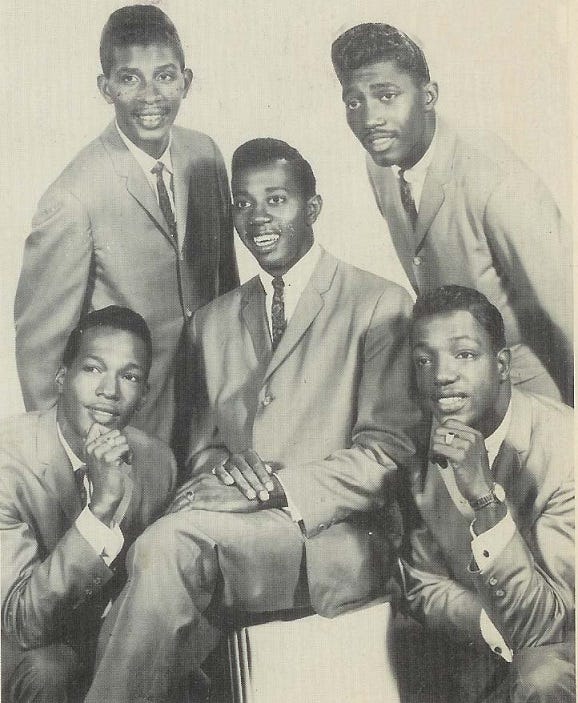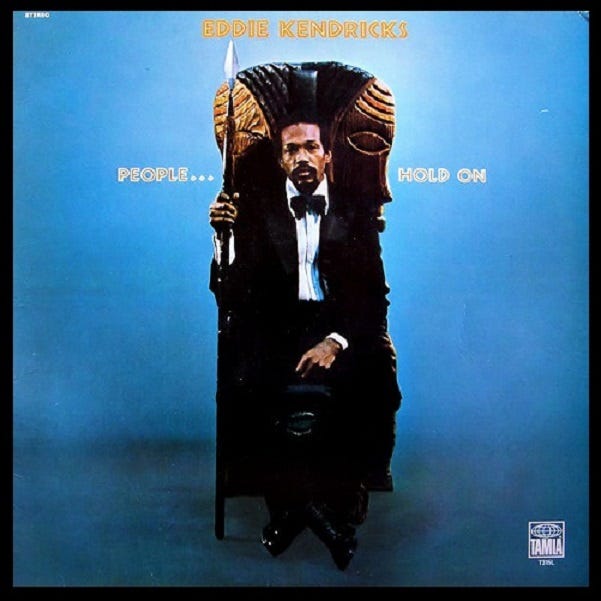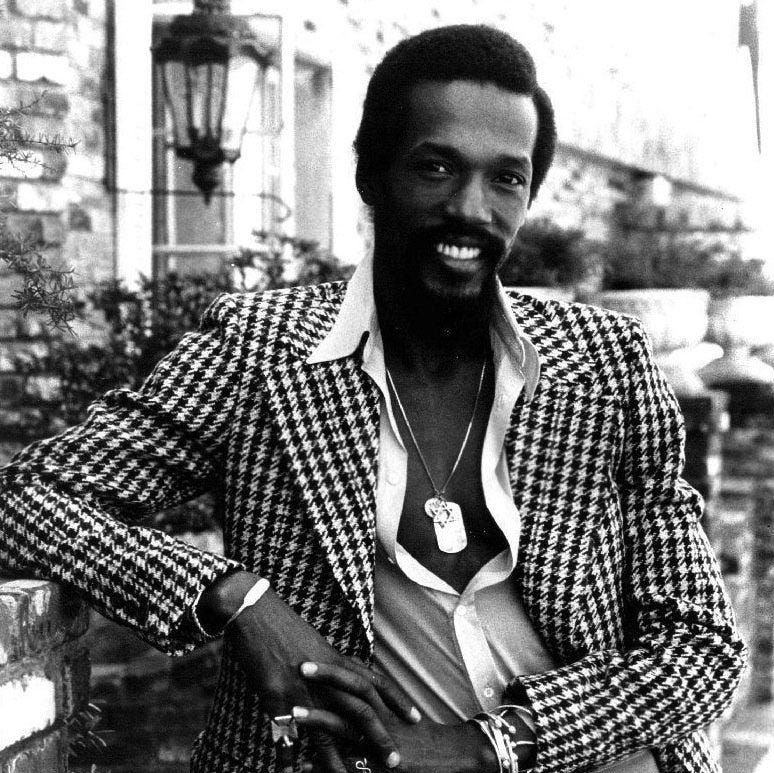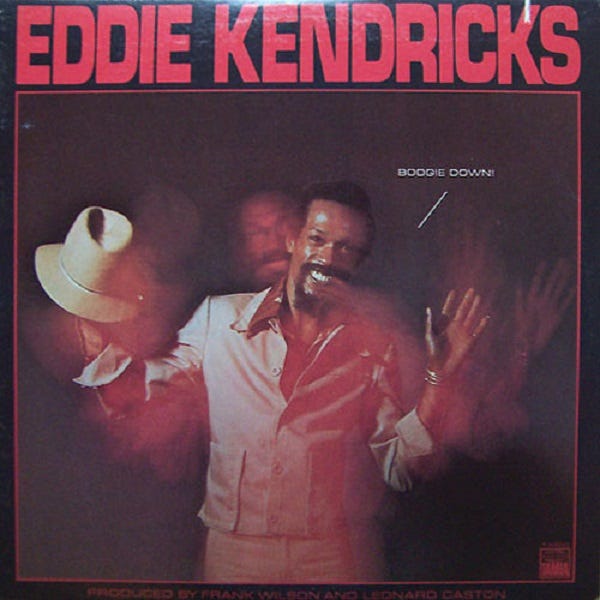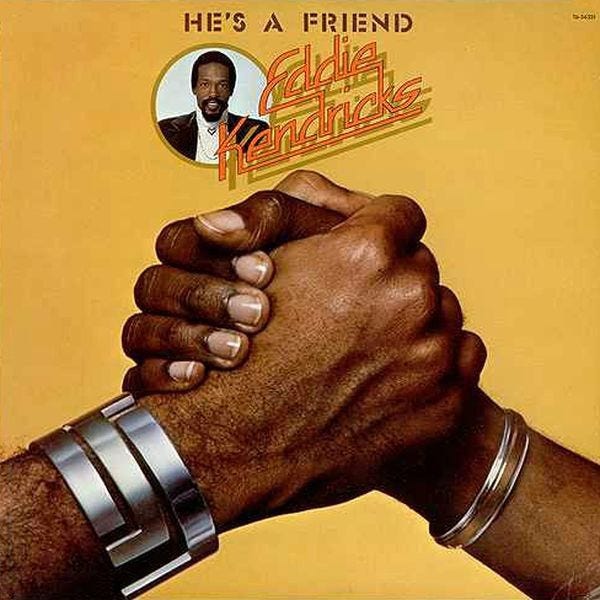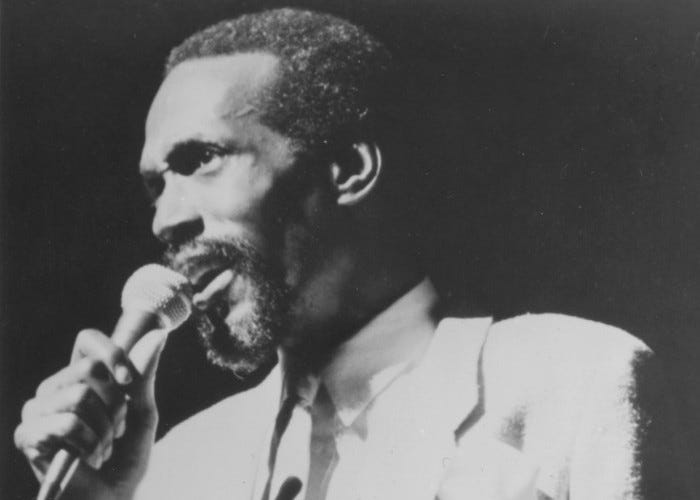Eddie Kendricks (December 17, 1939 – October 5, 1992) – My People...Hold On (1972)
The former Temptations lead singer's most socially conscious solo album featured this epic, powerful message song as its title track.
View most updated version of this post on Substack.
Open YouTube playlist of all songs in this post.
Eddie Kendricks was a founding member of the Temptations and one of their lead singers during the 1960s. After leaving the group in late 1970, he embarked on a solo career and had a #1 hit on the Billboard Hot 100 with “Keep On Truckin’” in 1973.
Born in small town Alabama, Edward James Kendrick moved with his family to Birmingham soon afterwards. There, he first met his elementary school classmate Paul Williams when the two had a fistfight, but they later became best friends while singing together in their church choir. Along with two other friends, Kendricks and Williams formed a doo-wop group in 1955 known as the Cavaliers and played shows around Birmingham. In an interview years later, Kendricks reflected on how being from the deep South made him more outspoken once he left:
“People out of Alabama are not supposed to talk back ... that's all they tell you, not to talk back. So ... I intend to speak my piece. I left there to speak my piece.”
Looking to break into the music business, the group first relocated to Cleveland and met their manager Milton Jenkins. He took the group with him when he moved to Detroit, where they renamed themselves the Primes and played nightclubs around the region. They were successful enough to create a female spin-off group called the Primettes who would later become The Supremes.
When the Primes broke up in 1960, Kendricks and Williams joined Otis Williams, Melvin “Blue” Franklin, and Elbridge “Al” Bryant in their rival Detroit group the Distants, renaming themselves the Elgins. They signed with Berry Gordy’s new Motown label in March, 1961 after changing their name one final time to the Temptations.
See our earlier posts on Paul Williams, Melvin “Blue” Franklin, David Ruffin, and producer Norman Whitfield for more on the Temptations’ musical history, and on songwriter/producer Frank Wilson regarding his collaborations with Kendricks during his solo career.
After David Ruffin was fired from the group in June, 1968, and his best friend Paul Williams’ health began declining around the same time period, Kendricks grew disenchanted with the Temptations. He began fighting with Otis Williams and Melvin “Blue” Franklin over the group’s direction, and unsuccessfully lobbied for the Tempts to go on strike until independent accountants could be retained to go over their finances. He also advocated for Ruffin to be allowed to return, which the other members strongly opposed. Kendricks remained friends with Ruffin, who convinced him to pursue a solo career after learning about his troubles within the group.
These disagreements came to a head at a November, 1970 show at the Copacabana in New York City, when a final fight between the three warring members caused Kendricks to leave between shows and never return. The last Temptations single to feature both Kendricks and Paul Williams (who left the group a few months later in April, 1971 after a spot was discovered on his liver) was “Just My Imagination (Running Away with Me).” Released in January, 1971, it featured Kendricks on lead vocals and went to #1 on both the R&B charts and Hot 100.
Kendricks negotiated a solo deal with Motown’s Tamla subsidiary, and songwriter and producer Frank Wilson was enlisted to produce his debut solo album All By Myself. It hit stores in April, 1971 but yielded no major hits, with its two singles both peaking at #37 R&B. However, the LP sold fairly well, landing at #6 on the R&B album charts and #80 on the Billboard 200. Its upbeat opening cut “Let's Go Back To Day One” was co-written by Patrice Holloway (Motown singer Brenda Holloway’s younger sister) and Gloria Jones, who recorded the original version of Soft Cell’s “Tainted Love” in 1965 that later became a Northern Soul classic.
For his next album People…Hold On, released in May, 1972, Wilson shared production duties with fellow songwriter and producer Leonard Caston Jr. They deliberately chose a new sound and more socially conscious direction for the LP that made it clear Kendricks was charting his own path. The profound, hopeful anthem “Someday We'll Have a Better World” was written by Norma Toney, a songwriter originally from Virginia who also wrote for David Ruffin, Freda Payne, and the Detroit Emeralds.
Caston and songwriter Anita Poree co-wrote the album’s lead single, the funky love poem “Eddie’s Love.” Issued in March, 1972, it reached #35 R&B. Wilson solely wrote its heartfelt opening cut “If You Let Me.” which was released in August as the album’s second single and hit #17 R&B. Its third single was the dancefloor hit “Girl You Need a Change of Mind,” which blew up as an album cut in New York City’s growing disco scene months before an edited version came out on 45’s and reached #13 R&B in early 1973. The track’s popularity in discos sent the LP to #13 on the R&B charts.
People…Hold On was one of the very last albums to be recorded at Motown’s original Studio A in the Hitsville U.S.A. building at 2648 West Grand Boulevard. Recording sessions took place in January, 1972, when the label was in the process of shutting down its Detroit operations and its house band the Funk Brothers had been either laid off or asked to relocate to Los Angeles. Kendricks’ touring band The Young Senators (from Washington, D.C.) played on the LP. As Young Senators percussionist Jimi Dougans recalled in a 2020 interview:
“They brought us to Detroit...West Grand Boulevard. Down in the basement—we called it the Snake Pit. It was a ton of snow outside, knee-high. Wasn’t nobody on the streets; we were the only ones. One session, ‘Girl You Need A Change Of Mind,’ was at three o’clock in the morning, when everybody’s supposed to be asleep. We were up. The engineer was up. Producers were up. Eddie was up recording.”
The epic message song title track “My People…Hold On” was the album’s masterpiece. Co-written by Caston and Poree (who also co-wrote “Girl You Need A Change Of Mind”), it had powerful, Afrocentric rhythms that echoed the LP’s cover art, a spiritual chorus, and lyrics that spoke of how to reach the promised land:
“The hawk must fall…let the dove fly high. Hold onto love…let its light be your guide. In peace, let us trust…before we turn to ashes and dust. Let us all stand together! I realize our hearts are tried…I can see the struggle in your eyes.”
The album’s commercial success thanks to “Girl You Need a Change of Mind” paved the way for Kendricks’ next single, which was aimed directly at the dancefloor. Wilson produced “Keep On Truckin'” (and co-wrote it with Caston and Poree) which was first released in an eight minute version on Kendricks’ self-titled album that dropped in May, 1973. When it was issued as a single that August, “Keep On Truckin'” went to #1 on both the R&B charts and Hot 100, making Kendricks the only former Temptation to score a #1 pop hit. It was later notably remixed by Tom Moulton.
In the wake of the song’s massive success, Motown filmed a mini-documentary on Kendricks as a promotional video, titled Portrait of Eddie Kendricks, soul musician.
Wilson and Caston produced his follow up single “Boogie Down,” co-written with Poree. Released in December, 1973, it was another dancefloor and radio smash, spending three weeks at #1 R&B and peaking at #2 on the Hot 100. It quickly became the title track to Kendricks’ next album Boogie Down! which hit stores in February, 1974, and a staple of his live concerts.
Boogie Down! went to #1 on the R&B album charts and #30 on the Billboard 200. It was packed with solid cuts including its dynamite, semi-autobiographical opening track “The Thin Man” and the album’s superb second single “Son of Sagittarius” which featured a guest appearance by Melvin “Blue” Franklin on backing vocals and made it to #5 R&B and #28 on the Hot 100. Both were co-written by Wilson, Caston and Poree.
Wilson and Caston co-produced two more albums for Kendricks, For You (1974) and The Hit Man (1975). He then teamed up with superstar Philly producer and original core MFSB member Norman Harris for his next LP, He’s A Friend.
Released in February, 1976, the entire album was a hit in discos, with the Philly soul-disco cuts “Chains” (co-written by Harris and fellow legends Allan Felder, Bunny Sigler, and Ron Tyson) and “Get It While It’s Hot” (co-written by Mike Holden and the unsung genius Theodore Life) both reaching #3 on dance charts. Its title track was co-written by Felder, Bruce Gray, and T.G. Conway, and went to #2 R&B, only kept out of the top spot by Johnnie Taylor’s mega-hit “Disco Lady.”
Harris also produced Kendricks’ eighth studio album Goin’ Up In Smoke, released in September, 1976. Like He’s A Friend, it was recorded at Sigma Sound Studios in Philadelphia.
Allan Felder wrote or co-wrote over half the LP’s songs, including the epic heartbreak tale “The Newness Is Gone” and its powerful, apocalyptic title track that went to #11 on dance charts and #30 R&B.
Sadly, by the late seventies Kendricks found it increasingly more difficult to hit the upper vocal range he had become famous for, a result of his chain smoking since the Temptations’ early days. In 1982, following the group’s highly successful reunion tour, he went to a doctor who found what was described as a “pin drop” of cancer on one of his lungs. But Kendricks allegedly refused to undergo chemotherapy because he was afraid he would lose his hair.
Left untreated, the cancer spread, and nine years later in late 1991 he had one lung removed. He recovered and was able to resume performing, but the following year fell ill again and died in a Birmingham hospital, gone far too soon at age 52.
Happy Birthday in Heaven to the legend Eddie Kendricks.
Further info:
“Eddie Kendricks, 52; Sang With the Temptations,” obituary, The New York Times, October 7, 1992.
“Eddie Made You Feel You Were His 'Everything',” Washington Post, October 9, 1992.
“Eddie Kendricks' 'People' Was No Accident,” by Ayana Contreras, Downbeat, February 11, 2020.
#soul #funk #disco #Motown #Temptations #FrankWilson #EddieKendricks




